Originally titled Ace the DLPT, this book was used as a tool to pass the Defense Language Proficiency Test, a battery based on the [Link removed - login to see]'s (ILR) professional standards of fluency. The standard is high, with professional fluency based on a score of 3 in both listening and reading. (Some agencies require a 3 in speaking as well.) While a score of 3 out of a possible 5 may not sound great to someone who isn't familiar with ILR, it's about the highest level a non-native speaker can attain. In fact, many native speakers of English (Americans, British, etc.) don't even score a 3 in speaking English, their own language. And I have heard of native Spanish speakers failing their oral proficiency interviews in Spanish because their fluency was regional or incomplete. For instance, talking about Arabic, just because you were born in Egypt and understand Egyptians perfectly doesn't necessarily mean you speak proper Arabic (MSA) proficiently. In fact, proficiency in MSA is often correlated to the education level of the speaker. Of course, since Arabic is a diglossic language, being fluent in dialect is an invaluable skill in itself. And while there are DLPTs that test your dialect abilities, Ace My Language - Arabic will prepare you for testing in Modern Standard Arabic, the language of educated Arabs and officials.
As stated, this book's goal is to get you to a 2+ or 3 level of listening and reading proficiency. It contains reading passages followed by questions. It contains questions for listening cuts that are on a companion CD. The material is similar to what you might expect in a DLPT, but having used this book and taken multiple DLPTs, I can tell you that the DLPT V standard goes a bit beyond this book.
If you're looking for a test-prep book for a university class, then this book is probably more than enough. Just use it as an exercise book and you'll impress your teacher.
My rant for the day: And by the way, if you ever meet someone who brags about how fluent they are (and we all have), then bring up the DLPT and ILR standards. Those are the only legitimate and official fluency standards, and they are the ones that determine if someone is good enough for a position. (Europeans might use a different system for all I know.) I don't mean to sound like a dick, but having a B.A. in a language doesn't typically amount to great ILR scores. Many universities use their own oral proficiency interview (OPI) standards, usually based on a 15-20 min. telephone or VTC conversation. These standards are completely meaningless in the real world. They're usually just requirements for graduation and say nothing about your professional fluency. To even apply for most higher-paying linguist jobs in the government (and you can look up what agencies those are), you have to demonstrate to them on the same playing field as everyone else that you actually have the skill they need. In other words: DLPTs and military-style interviews. Did I mention there's a limit to how many times you can test before you're wasting their time?
Okay, let's suppose you don't want to work for the government and instead have dreams of being a translator. Maybe work with fiction or freelance translation? Wow that sounds nice, doesn't it? Again, I probably will come off as a dick here, but it's unrealistic to expect a job that pays the bills in either freelance or fiction translation with just a B.A. in whatever language. (This doesn't just apply to Arabic, but it especially applies to the languages that are taught in virtually every high school: Spanish, French and German.) Why? Most prestigious works of fiction are not going to be entrusted to a 20-something year old translator without experience. Period. Fiction goes to Ph.D.'s. Let's face it: the more renowned the author, the more your curriculum vitae needs to shine. And a B.A. in language is about as shiny as a turd. What about freelance translation? Well, first, good luck finding it if you want to translate from a commonly taught language into English. Fr-Eng, Ger-Eng and Sp-Eng translators are a dime a dozen. If you get work, don't expect great pay. If you don't like the idea of having to earn your way up to good pay, if you somehow think a B.A. entitles you to good, easy money...Basically if you don't have a work ethic, then just forget about freelance work. You'll ruin your reputation before even getting started. Second, unless you have a real specialty (e.g., engineering, medicine, science, law, software design or chemistry), then you should consider a career in something else and only pick up freelance work as a side job. Many of the good freelance jobs are trade-specific. How can you expect to translate something into English that you don't even understand in English let alone in another language? The fact is you can't without making an arse of yourself and the company that's paying you.
Why the rant with the review? I'll be honest. My rant is mostly for languages other than Arabic, since Arabic isn't really taught that much in our country. But a lot of would-be linguists are simply full of crap when it comes to their abilities. And the basic American college kid attitude is that work should just fall into your lap the moment you cross the stage at graduation. That's sabotaging yourself. That's just not the way it works, especially in linguist work./rant
Need Help With a Test?
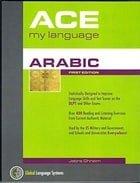 Posted : 14 years, 1 month ago on 30 May 2011 04:24
(A review of Ace My Language - Arabic Edition)
Posted : 14 years, 1 month ago on 30 May 2011 04:24
(A review of Ace My Language - Arabic Edition) 0 comments, Reply to this entry
0 comments, Reply to this entry
Big Things Come in Small Packages
 Posted : 14 years, 1 month ago on 30 May 2011 04:45
(A review of A Pocket Dictionary of Synonyms and Antonyms)
Posted : 14 years, 1 month ago on 30 May 2011 04:45
(A review of A Pocket Dictionary of Synonyms and Antonyms)It's hard to say how awesome this 100 page book is. If you know anything about Arabic books, then you know searching for a good thesaurus is like searching for El Dorado. There just aren't many around ([Link removed - login to see]). This little book even boldly claims to be the first of its kind. Now, I'm told there's a difference between a "dictionary of synonyms and antonyms" and a thesaurus, but wordsmithing aside, this book is a thesaurus.
Most common words of the media lexicon can be found in simple, alphabetical order. The words following each entry include high-level synonyms and antonyms. However, there are no example sentences, so usage will have to be determined from another source. The book also has two mini-appendices: one for animal habitats and one for animal sounds. Set phrases such as "a chicken clucks, a dog barks, a sheep bleats, etc." are given in Arabic. The real value of this book is as a quick look-up for standard, "higher-level" synonyms for simple or "lower-level" vocabulary. By "higher-level," I mean words that are considered more-or-less to be used less frequently in written media (newspapers, magazines, Internet articles and journals) or hardly ever in spoken media (broadcasts, public announcements, official speeches). While you and I, as native English speakers, may scoff at the idea of trying to "sound educated" or "higher level" in our own language, you should probably understand that among educated Arabs there is a deep admiration for writers, poets and speakers who are able to breathe life into the classical style of the language. This may be because the purest form of the language is believed to be as old as al-Qur'an al-Karim (the Koran), and people who speak properly are doing culture a favor. Well, that's what I've taken from culture classes and interactions with Arab-American teachers, anyway.
Sadly, this little book was intended for Arab audiences only and is therefore printed only in Arab countries. You may be able to find it through a book importer.
Most common words of the media lexicon can be found in simple, alphabetical order. The words following each entry include high-level synonyms and antonyms. However, there are no example sentences, so usage will have to be determined from another source. The book also has two mini-appendices: one for animal habitats and one for animal sounds. Set phrases such as "a chicken clucks, a dog barks, a sheep bleats, etc." are given in Arabic. The real value of this book is as a quick look-up for standard, "higher-level" synonyms for simple or "lower-level" vocabulary. By "higher-level," I mean words that are considered more-or-less to be used less frequently in written media (newspapers, magazines, Internet articles and journals) or hardly ever in spoken media (broadcasts, public announcements, official speeches). While you and I, as native English speakers, may scoff at the idea of trying to "sound educated" or "higher level" in our own language, you should probably understand that among educated Arabs there is a deep admiration for writers, poets and speakers who are able to breathe life into the classical style of the language. This may be because the purest form of the language is believed to be as old as al-Qur'an al-Karim (the Koran), and people who speak properly are doing culture a favor. Well, that's what I've taken from culture classes and interactions with Arab-American teachers, anyway.
Sadly, this little book was intended for Arab audiences only and is therefore printed only in Arab countries. You may be able to find it through a book importer.
 0 comments, Reply to this entry
0 comments, Reply to this entry
The Arabic Sounds
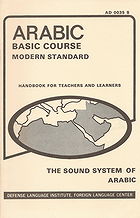 Posted : 14 years, 1 month ago on 30 May 2011 04:20
(A review of The Sound System of Modern Standard Arabic: A Handbook for Teachers & Learners)
Posted : 14 years, 1 month ago on 30 May 2011 04:20
(A review of The Sound System of Modern Standard Arabic: A Handbook for Teachers & Learners)This 78-page manual details the sounds of each vowel and consonant, diphthongs, double consonants, consonant clusters, syllable structure, word stress, rhythm and intonation of the Arabic language. This is a tall order for a small book, too tall in fact, but the trick is listening to a native speaker pronounce the examples given. Even without the benefit of a native, the book's real value lies in the attention it gives to each letter. Although the best way to learn is to listen, this manual does a decent job explaining some of the more common pronunciation pitfalls. You can always use it in conjunction with sound samples from the internet.
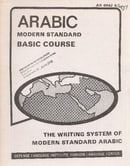 If you need practice with the writing system, there are several books out there. The one on the right is an old DLI textbook. It isn't the best book ever, but then again, you don't need a lot from a script book. Arabic writing is complex, but once you get it, you will never forget it. Honestly, I don't recommend wasting your money on a writing book unless you want to learn calligraphy or something. There are lots of free Arabic tools online you can use to learn how to write and read.
If you need practice with the writing system, there are several books out there. The one on the right is an old DLI textbook. It isn't the best book ever, but then again, you don't need a lot from a script book. Arabic writing is complex, but once you get it, you will never forget it. Honestly, I don't recommend wasting your money on a writing book unless you want to learn calligraphy or something. There are lots of free Arabic tools online you can use to learn how to write and read.
 If you need practice with the writing system, there are several books out there. The one on the right is an old DLI textbook. It isn't the best book ever, but then again, you don't need a lot from a script book. Arabic writing is complex, but once you get it, you will never forget it. Honestly, I don't recommend wasting your money on a writing book unless you want to learn calligraphy or something. There are lots of free Arabic tools online you can use to learn how to write and read.
If you need practice with the writing system, there are several books out there. The one on the right is an old DLI textbook. It isn't the best book ever, but then again, you don't need a lot from a script book. Arabic writing is complex, but once you get it, you will never forget it. Honestly, I don't recommend wasting your money on a writing book unless you want to learn calligraphy or something. There are lots of free Arabic tools online you can use to learn how to write and read. 0 comments, Reply to this entry
0 comments, Reply to this entry
Need To Improve Your Arabic Vocabulary?
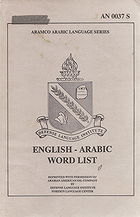 Posted : 14 years, 1 month ago on 28 May 2011 10:53
(A review of ARAMCO Arabic Language Series English-Arabic Word List)
Posted : 14 years, 1 month ago on 28 May 2011 10:53
(A review of ARAMCO Arabic Language Series English-Arabic Word List)A perfect beginner-intermediate vocabulary list.
This 450-page handy word list contains over 11,000 terms meant to provide a basic-intermediate vocabulary for ARAMCO's English speaking workers. Even though the book was clearly meant for a specific audience, it will serve as a great vocabulary list for any Arabic beginner. The list is arranged in English alphabetical order and contains both the standard written and common spoken forms of the word. If you cannot read Arabic yet, don't worry. You will still be able to say each word using its phonetic form, which is based on Saudi pronunciations. Although this book let's you get away with not being able to read proper Arabic script, you certainly won't learn any grammar or usage from it. Many English entries, however, are given with multiple Arabic synonyms, which is incredibly useful when you're trying to acquire vocabulary sets and not just individual terms. Otherwise, if you're like me and hate making flash cards but need a big word list, then this book is just what you need. Don't be afraid that it's from 1958, either. The words it contains are basic standard and are still taught today.
This 450-page handy word list contains over 11,000 terms meant to provide a basic-intermediate vocabulary for ARAMCO's English speaking workers. Even though the book was clearly meant for a specific audience, it will serve as a great vocabulary list for any Arabic beginner. The list is arranged in English alphabetical order and contains both the standard written and common spoken forms of the word. If you cannot read Arabic yet, don't worry. You will still be able to say each word using its phonetic form, which is based on Saudi pronunciations. Although this book let's you get away with not being able to read proper Arabic script, you certainly won't learn any grammar or usage from it. Many English entries, however, are given with multiple Arabic synonyms, which is incredibly useful when you're trying to acquire vocabulary sets and not just individual terms. Otherwise, if you're like me and hate making flash cards but need a big word list, then this book is just what you need. Don't be afraid that it's from 1958, either. The words it contains are basic standard and are still taught today.
 0 comments, Reply to this entry
0 comments, Reply to this entry
Obscure Arabic Dialect Gets Royal Treatment
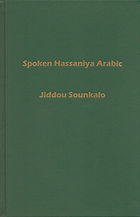 Posted : 14 years, 1 month ago on 28 May 2011 08:40
(A review of Spoken Hassaniya Arabic)
Posted : 14 years, 1 month ago on 28 May 2011 08:40
(A review of Spoken Hassaniya Arabic)Another from the Dunwoody series, Spoken Hassaniya Arabic has everything in an Arabic reference you could possibly want. The 30 reading selections are transcriptions of the audio files on the CD that accompanies the book (sold separately, FYI). The passages are rendered in phonetic Romanization as well as in Arabic script. Moreover, the Arabic letters are carefully vowelled to aid pronunciation. Following each section are a vocabulary and a phrase list (phonetic and Arabic scripts) with comparisons to French and standard Arabic (MSA) when appropriate. Also included with each selection are relevant language and cultural notes from the author about Mauritania and the dialect. The selections cover topics from girls' education to emigration to cell phones. At the end of the book are careful translations of each passage and a thorough glossary.
There are two companion CDs for this 150 page work. The speakers are all either Mauritanian residents or Mauritanian emigrants. And the passages are read at a natural spoken pace; i.e., the selections are basically interviews in which the speakers are asked their opinion on a range of topics regarding Mauritanian customs and culture. The conversations are therefore between native speakers so the pace reflects this.
As with most quality dialect books, a solid background in MSA and familiarity with some dialect and French is helpful. This book is not for beginners, but it is a very rewarding study for advanced students.
There are two companion CDs for this 150 page work. The speakers are all either Mauritanian residents or Mauritanian emigrants. And the passages are read at a natural spoken pace; i.e., the selections are basically interviews in which the speakers are asked their opinion on a range of topics regarding Mauritanian customs and culture. The conversations are therefore between native speakers so the pace reflects this.
As with most quality dialect books, a solid background in MSA and familiarity with some dialect and French is helpful. This book is not for beginners, but it is a very rewarding study for advanced students.
 0 comments, Reply to this entry
0 comments, Reply to this entry
Listen-Read-Translate (LRT) - Algerian!
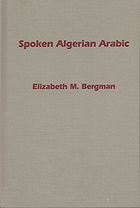 Posted : 14 years, 1 month ago on 28 May 2011 08:26
(A review of Spoken Algerian Arabic)
Posted : 14 years, 1 month ago on 28 May 2011 08:26
(A review of Spoken Algerian Arabic)Spoken Algerian Arabic is roughly divided into three major sections: a grammar, a collection of 36 audio-transcriptional selections, and a glossary. The book uses both IPA style transliteration as well as semi-vowelled Arabic script, but it relies heavily on the IPA in the grammar section. The author makes it clear that the book is intended for students with prior experience in MSA and at least one other dialect, but Arabic script is curiously left out in the grammar "sketch."
 The real meat of the book is in the 36 selections. Each section is first introduced and presented word-for-word, with all the false starts and natural idiosyncrasies of spoken language, in modified IPA transcription. This is because the passages are given in a conversational or interview style. Opposite this is the Arabic. Along with the two transcriptions is a vocabulary list of interesting words (IPA and Arabic). And following this list are interesting linguistic and cultural notes pertaining to the topic of the selection. These are a really nice addition. Finally, after all of these goodies, you get a polished English translation.
The real meat of the book is in the 36 selections. Each section is first introduced and presented word-for-word, with all the false starts and natural idiosyncrasies of spoken language, in modified IPA transcription. This is because the passages are given in a conversational or interview style. Opposite this is the Arabic. Along with the two transcriptions is a vocabulary list of interesting words (IPA and Arabic). And following this list are interesting linguistic and cultural notes pertaining to the topic of the selection. These are a really nice addition. Finally, after all of these goodies, you get a polished English translation.
The last section is the glossary, rendered awkwardly in IPA but listed in Arabic alphabetical order. The glossary serves not only as a quick dictionary but also as an index.
Overall, this book offers a lot. There is an accompanying audio CD that contains the 36 passages (hence "spoken" Algerian); however, the text and audio materials are sold separately at the publisher. This book should definitely be used with the CD, though, because Sections II and III are essentially exercises in listening and transcription-translation. In other words, Spoken Algerian Arabic can be used as a sort of exercise book, although it does not have quizzes. Listen-Read-Translate. (Or if you want to reap the most out of this book: Listen-Transcribe-Translate!)
My only complaint is the heavy use of IPA. The author assumes you know Arabic. Well, why not forgo IPA altogether then? And while it is not explicitly assumed that you know French, there are no pronunciation aides for French terms in the book. In other words, knowing a bit of French will go a long way, which is a little disappointing since my Arabic is much better than my French.
 The real meat of the book is in the 36 selections. Each section is first introduced and presented word-for-word, with all the false starts and natural idiosyncrasies of spoken language, in modified IPA transcription. This is because the passages are given in a conversational or interview style. Opposite this is the Arabic. Along with the two transcriptions is a vocabulary list of interesting words (IPA and Arabic). And following this list are interesting linguistic and cultural notes pertaining to the topic of the selection. These are a really nice addition. Finally, after all of these goodies, you get a polished English translation.
The real meat of the book is in the 36 selections. Each section is first introduced and presented word-for-word, with all the false starts and natural idiosyncrasies of spoken language, in modified IPA transcription. This is because the passages are given in a conversational or interview style. Opposite this is the Arabic. Along with the two transcriptions is a vocabulary list of interesting words (IPA and Arabic). And following this list are interesting linguistic and cultural notes pertaining to the topic of the selection. These are a really nice addition. Finally, after all of these goodies, you get a polished English translation.The last section is the glossary, rendered awkwardly in IPA but listed in Arabic alphabetical order. The glossary serves not only as a quick dictionary but also as an index.
Overall, this book offers a lot. There is an accompanying audio CD that contains the 36 passages (hence "spoken" Algerian); however, the text and audio materials are sold separately at the publisher. This book should definitely be used with the CD, though, because Sections II and III are essentially exercises in listening and transcription-translation. In other words, Spoken Algerian Arabic can be used as a sort of exercise book, although it does not have quizzes. Listen-Read-Translate. (Or if you want to reap the most out of this book: Listen-Transcribe-Translate!)
My only complaint is the heavy use of IPA. The author assumes you know Arabic. Well, why not forgo IPA altogether then? And while it is not explicitly assumed that you know French, there are no pronunciation aides for French terms in the book. In other words, knowing a bit of French will go a long way, which is a little disappointing since my Arabic is much better than my French.
 0 comments, Reply to this entry
0 comments, Reply to this entry
A Grammar that's actually Fun...Sort of
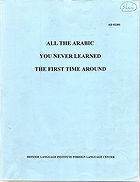 Posted : 14 years, 4 months ago on 24 February 2011 04:19
(A review of All the Arabic You Never Learned the First Time Around)
Posted : 14 years, 4 months ago on 24 February 2011 04:19
(A review of All the Arabic You Never Learned the First Time Around)After learning the alphabet, this is the best place to start. This book assumes you know next to nothing about Arabic grammar and walks you through complex concepts using lots of examples, drills and charts. Unlike most other Arabic grammars, this book was written with students, not scholars, in mind. Many of the explanations are informal, and some are humorous. Overall, the author strikes a palatable blend of substance and style. Most of the book is dedicated to conjugation and the verbal measures. But it contains lessons ranging from simple conditional constructs to those rare rules even educated natives forget. Unfortunately, this book was never made available to the general public. I think it was originally published for university graduate students and then later for military students. However, from time to time, copies do crop up on eBay.
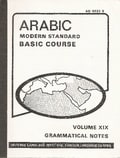 If you prefer an oldschool, no-frills, dry-as-toast, kick-in-the-nuts presentation of grammar, then try to get your mitts on this beast: Grammatical Notes from DLI c1970s (thumbnail on the right). Many of the DLIFLC books were written specifically for military linguists. The pace of these books is a lot faster. This doesn't necessarily mean better, but if you want to see how the pro's do it, then keep an eye out for oldies like this one.
If you prefer an oldschool, no-frills, dry-as-toast, kick-in-the-nuts presentation of grammar, then try to get your mitts on this beast: Grammatical Notes from DLI c1970s (thumbnail on the right). Many of the DLIFLC books were written specifically for military linguists. The pace of these books is a lot faster. This doesn't necessarily mean better, but if you want to see how the pro's do it, then keep an eye out for oldies like this one.
 If you prefer an oldschool, no-frills, dry-as-toast, kick-in-the-nuts presentation of grammar, then try to get your mitts on this beast: Grammatical Notes from DLI c1970s (thumbnail on the right). Many of the DLIFLC books were written specifically for military linguists. The pace of these books is a lot faster. This doesn't necessarily mean better, but if you want to see how the pro's do it, then keep an eye out for oldies like this one.
If you prefer an oldschool, no-frills, dry-as-toast, kick-in-the-nuts presentation of grammar, then try to get your mitts on this beast: Grammatical Notes from DLI c1970s (thumbnail on the right). Many of the DLIFLC books were written specifically for military linguists. The pace of these books is a lot faster. This doesn't necessarily mean better, but if you want to see how the pro's do it, then keep an eye out for oldies like this one. 0 comments, Reply to this entry
0 comments, Reply to this entry
Gothic & RPG sexiness
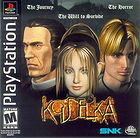 Posted : 14 years, 4 months ago on 23 February 2011 03:06
(A review of Koudelka)
Posted : 14 years, 4 months ago on 23 February 2011 03:06
(A review of Koudelka)Koudelka is a fantastic, original horror game. It is nothing like Resident Evil. Not even close. If anything, it's maybe a little like Galerians.
Combat is delivered in RPG format: turn-based, simple, and random. Where this game shines is in its plot, and the voice acting in Koudelka is as excellent as Metal Gear: Solid or any other game with high production value. The game really does have an amazing script. The graphics are also quite good for the PSone.
While I typically do not enjoy RPG turn-based combat (because I typically do not enjoy RPGs at all), I found it tolerable because so much of the rest of the game is just excellent.
The game follows a gruff and beautiful gypsie girl, a soul-searching adventurer and a haunted Vatican bishop. They meet fatefully in an English manor, each after a different thing. Koudelka is called to the mansion by spirits. Edward is in search of treasure, and James is returning to his past. The three learn more about each other as the story unravels. The endings are amazing.
I would say that Koudelka is a near perfect horror game. The main character, the girl, is completely shrouded in angst and loneliness. The bishop is full of regret, and the young man is indecisive and arrogant. The characters are really believable.
Sadly, this game gets a lot of negative feedback. For the life of me, I do not know why that is. Tastes vary, for sure, but the quality of this game is high in several aspects. It is better than Resident Evil in virtually every way.
Combat is delivered in RPG format: turn-based, simple, and random. Where this game shines is in its plot, and the voice acting in Koudelka is as excellent as Metal Gear: Solid or any other game with high production value. The game really does have an amazing script. The graphics are also quite good for the PSone.
While I typically do not enjoy RPG turn-based combat (because I typically do not enjoy RPGs at all), I found it tolerable because so much of the rest of the game is just excellent.
The game follows a gruff and beautiful gypsie girl, a soul-searching adventurer and a haunted Vatican bishop. They meet fatefully in an English manor, each after a different thing. Koudelka is called to the mansion by spirits. Edward is in search of treasure, and James is returning to his past. The three learn more about each other as the story unravels. The endings are amazing.
I would say that Koudelka is a near perfect horror game. The main character, the girl, is completely shrouded in angst and loneliness. The bishop is full of regret, and the young man is indecisive and arrogant. The characters are really believable.
Sadly, this game gets a lot of negative feedback. For the life of me, I do not know why that is. Tastes vary, for sure, but the quality of this game is high in several aspects. It is better than Resident Evil in virtually every way.
 0 comments, Reply to this entry
0 comments, Reply to this entry
God, why? Why do bad games happen to good people?
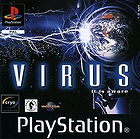 Posted : 14 years, 4 months ago on 23 February 2011 02:34
(A review of Virus: It Is Aware)
Posted : 14 years, 4 months ago on 23 February 2011 02:34
(A review of Virus: It Is Aware)If you check out my profile and reviews, then you'd know that I'm a huge fan of survival-horror games. I try to give lesser known games a chance, maybe show them to people who missed them back in their heydey. So, when I found Virus: It is Aware, I thought I had found another game that would quietly impress.
Holy shit, was I wrong. This travesty of a video game was "based" on a movie by the same name starring Jamie Lee Curtis. Never saw the movie, but I will go ahead and guarantee that the movie is better. I'll just throw the main points out:
[1] The game has NO story.
[2] The game is French, and the English subtitles are ass.
[3] The game is buggy beyond belief.
[4] The game is RIDICULOUSLY hard to beat (due to [3]).
[5] The ending is...wait, what ending?
Happily, this game was never released in the U.S. Not so happily, I actually paid money to play this crap.
Holy shit, was I wrong. This travesty of a video game was "based" on a movie by the same name starring Jamie Lee Curtis. Never saw the movie, but I will go ahead and guarantee that the movie is better. I'll just throw the main points out:
[1] The game has NO story.
[2] The game is French, and the English subtitles are ass.
[3] The game is buggy beyond belief.
[4] The game is RIDICULOUSLY hard to beat (due to [3]).
[5] The ending is...wait, what ending?
Happily, this game was never released in the U.S. Not so happily, I actually paid money to play this crap.
 0 comments, Reply to this entry
0 comments, Reply to this entry
Blood Tea & Red String [Region 1] [US Import] [NTSC] review
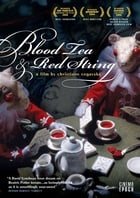 Posted : 14 years, 9 months ago on 2 October 2010 01:59
(A review of Blood Tea & Red String [Region 1] [US Import] [NTSC])
Posted : 14 years, 9 months ago on 2 October 2010 01:59
(A review of Blood Tea & Red String [Region 1] [US Import] [NTSC])A lot of time and effort went into the making of this stop-animation, full-length feature. There is no spoken dialog in the film, but there's not a need for any. The story is told through the amazing sets. This is not an artsy, fartsy indie film. It's an adventure fantasy story with some bizarre elements; it reminded me of the Dark Crystal, except quieter and eerier. I wish more people would watch this movie, because the creator, Christiane Cegavske, put a lot of heart into it.
 0 comments, Reply to this entry
0 comments, Reply to this entry
 Login
Login
 Home
Home 34 Lists
34 Lists 54 Reviews
54 Reviews Collections
Collections